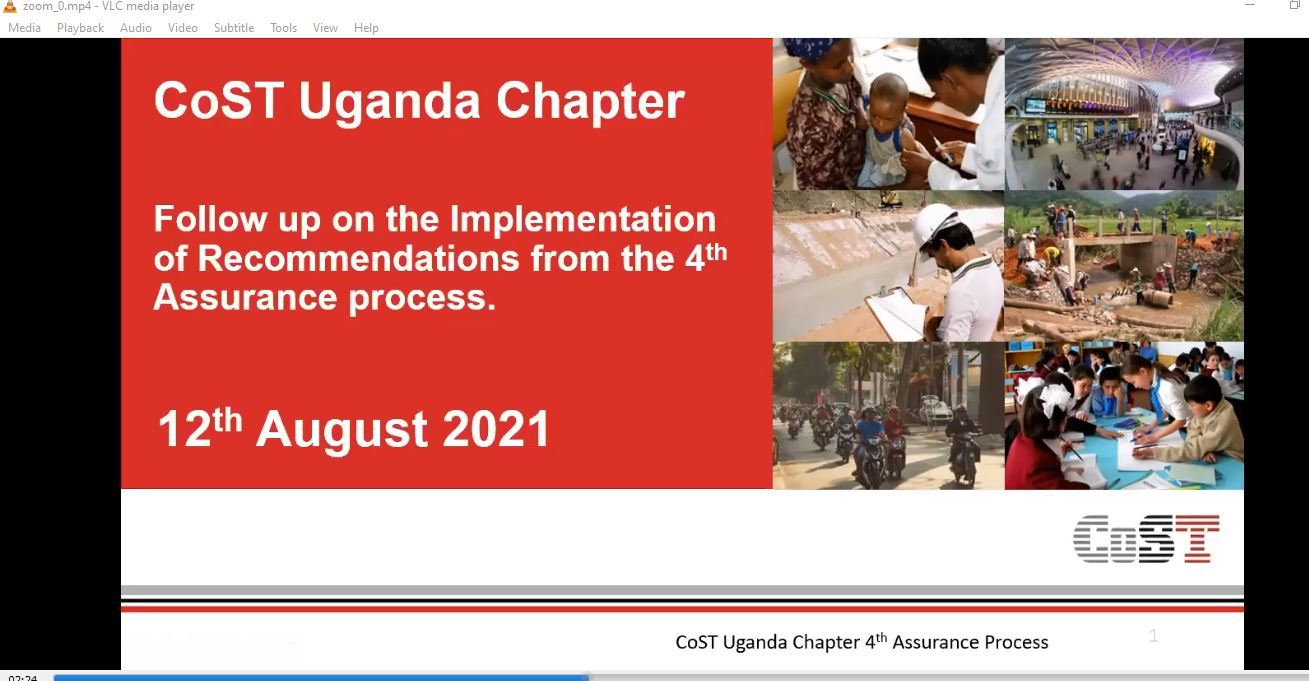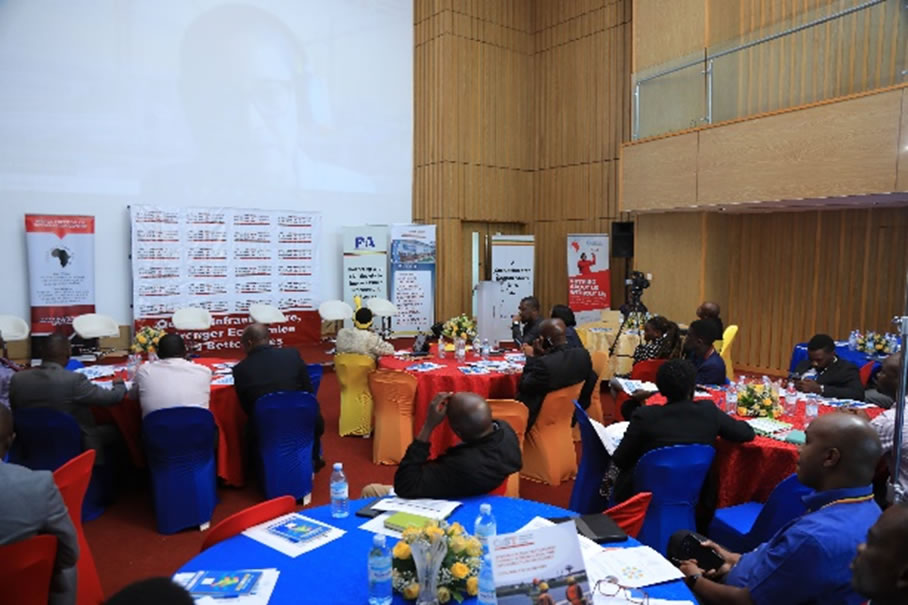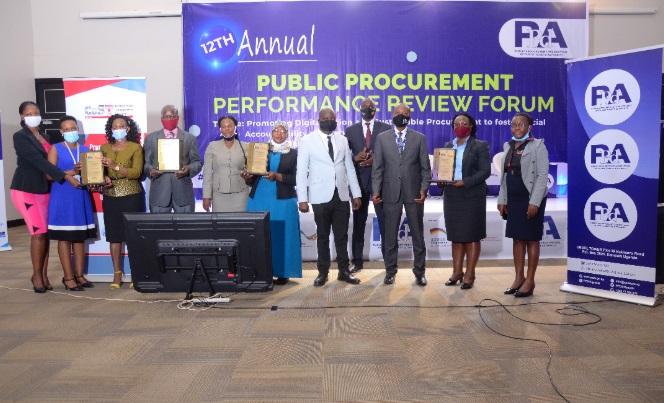
CoST Uganda conducted a webinar to follow up implementation of recommendations from the 4th assurance process. The webinar was held on 12th August 2021. It was moderated by a senior Journalist from UBC TV Mr. Ssemakula Gyagenda and drew stakeholders/participants from government / MDAs, CSOs and media. Government/ MDAs was represented by; Office of the Prime Minister (OPM), Ministry of Works and Transport (MoWT), Ministry of Finance, Planning and Economic Development (MoFPED), Ministry of Education and Sports (MoES), Public Procurement and Disposal of Public Assets Authority (PPDA), Kampala Capital City Authority (KCCA), Uganda National Roads Authority (UNRA), Uganda Road Fund (URF). Civil Society organizations represented by Transparency International Uganda, Anti-Corruption Coalition Uganda, Allied Support for Rural Empowerment and Development and media by Shift Media News, Business Focus Online, BBS TV and UBC TV among others.
The 4th assurance process was conducted in 2020 across eight high spend Procuring and Disposing Entities, the entities that participated included;
- Ministry of Education and Sports (1 project),
- Ministry of Health (3 projects),
- Ministry of Works and Transport (7 projects)
- Uganda National Roads Authority (UNRA) (4 projects).
- Ministry of Water and Environment (1 projects)
- Wakiso District Local Government (2 projects)
- National Water and Sewerage Corporation (2 projects)
- Kampala Capital City Authority (3 projects)
The overall purpose of the webinar was to engage the PDEs on the CoST assurance process, share experiences, actions made on the implementation of recommendations from the 4th Assurance process. The 4th Assurance report was released on 10th February 2021, by the Minster of Works and Transport, Gen, Edward Katumba Wamala who is also the Champion of CoST Uganda. In his remarks, read by the Engineer in Chief, Eng. Samson Bagonza, the Minister noted;
”My Ministry will work with CoST Uganda and all other stakeholders to close the gaps identified in the projects assured. The NRM Government fully supports the principles of fair business practices and transparency when handling matters that concern the public and indeed public resources. There is no doubt therefore that the entire Government leadership up to the highest level is in support of independent monitoring of public infrastructure projects, as long as the findings and recommendations are used for purposes of continuous improvement.” Hon. General Katumba Wamala, MoWT Affirming the relevance of the Assurance process.
Following the launch of the reports, various public engagements were held, and letters of recommendations were delivered to various entities and oversight bodies. 6 months down the road, the webinar to follow implementation of recommendations and appreciation on the good practices was timely. In addition to following up on actions and reforms made at policy and project level, the webinar sought to engage stakeholders to recommit to improving transparency and accountability in public infrastructure delivery processes.
Targeted entities shared feedback on status of implementation of recommendations. It is important to note that the entities did not just receive the recommendations and didn’t act on them, but, they made efforts to implement them, and we would like to commend Government.
The Office of the Prime Minister, the leader of Government business, and monitor of all Government MDAs in implementation of service delivery, acknowledged receipt of CoST recommendations and reported having included them into the Annual performance assessment reports, and the Prime Minister would be engaging each MDA on the experiences and concerns on infrastructure performance, in addition, the issues submitted mostly had policy proposals and would be included in the policy action implementation status chapter in the Rt. Hon. PM’s overview communication to the Cabinet retreat.
In regards to entity actions, commendable progress was reported by PPDA, KCCA, MoFPED and MoES. Some of the key feedback included;
- From PPDA, regarding the standard disclosure template of key activities undertaken in infrastructure, PPDA noted that arrangement / planning is ongoing to ensure that a standard reporting template is in place for reporting infrastructure activities by entities, regarding compliance with the local content-the local content committee was expected to monitor compliance of local content and provide compliance certificates to PPDA, regarding the alignment of GPP/EGP to OC4IDS, the GPP was under alignment to the standard and the EGP was following through with commendable engagements being held with MoFPED and CoST. PPDA and MoFPED pledged to continue partnering with CoST to ensure that disclosure is enhanced in this area among others.
- Ministry of Works and Transport noted that, from the recommendations on seven projects, alongside recommendations on sector wide improvements. To address the recommendations at project level, the Ministry had developed two internal memos covering requirements for disclosure and key considerations for transparency, citizen engagement and accountability to project managers. The Ministry was working with other sector entities, and oversight bodies to improve performance of the sector, and had, made strides to operationalize the work of CoST in Uganda through formalizing the CoST charter as a government document, a process that was nearing completion. This would enable the initiative sail through working across stakeholders with less impediments.
- Meanwhile, KCCA noted that; regarding lack of /no standard disclosure template for reporting infrastructure activities, KCCA is among the pilot entities under the EGP, prior to implementation of the e-GP, KCCA was utilizing both manual (Procurement & Contract Registers) and Automatic (GPP & KCCA Procurement Track) systems for data retrieval and achieving, and the portal requires them to upload various contract and project data, this will inform data management and retrieval, committed to always provide audience and attention to the assurance team, the ITI team and review draft assurance reports, strengthened quality checks and controls on documentation to address any gaps in documentation. In addition, KCCA projects especially KIIDP2 developed a standard Contract Register which is updated from time to time. “We have improved on disclosure, we are also now using social media to enhance disclosure, although it comes with cost implications since it’s something that we were not budgeting for but now we have started including it in our budget”, said Ms. Doreen Akatuhwera Head Procurement and Disposal Unit, KCCA.
- Ministry of Education and Sports, in their updates noted that, they have made efforts to implement some of the recommendations such as; regarding lack of standard disclosure template for the ministry, acknowledged there was no standard at ministry level, the project had adopted the World Bank template. The ministry had enhanced its stakeholder engagement approach, in that, for all the new projects, they now prepare, plan and implement projects with the involvement of all stakeholders both at local government, project, national and institutional levels and project reports are regularly prepared and submitted to the responsible units among others.
- On their end, Ministry of Finance, Planning and Economic Development, had in principle adopted the OC4IDS for incorporation into the EGP, and had held several engagements with CoST on how the standard can improve public procurement sector performance in regards to data categorization, standardization, analysis and decision making. The Ministry had also involved CoST in the reviews of the Methodology for the Assessment of the Public Procurement System, and recommendations on transparency, accountability, private sector engagement, business integrity had been included in the report. Considerations for access to information and transparency were regarded high by the Ministry and as provided for in the Public Procurement Policy.
From the webinar, we note a growing interest for Government to take action on recommendations that inform performance of the public infrastructure delivery processes in a bid to realize the National Development Plan objectives. In the words and guidance of the Commissioner, Public Policy Procurement, Ministry of Finance, Mr. David Kiyingi, “public officials should not avoid accounting to stakeholders, and the public on recommendations made, besides, we deliver services to the same citizens, and their satisfaction is of a great per amount to Government, it is through accountability and feedback that we identify the gaps for continuous improvements”. Therefore, we find the engagements on follow up and sharing experiences on how public entities are addressing recommendations very handy, both for the demand and supply side in improving performance of the public infrastructure sector.
The stakeholders pledged and committed to work with CoST Uganda to enhance disclosure for instance MoFPED acknowledged that there is need for increased disclosure and this is in line with the public sector procurement policy, there is need to do capacity building to improve disclosure. MoWT committed to follow up with respective project managers to ensure that all the recommendations are implemented and KCCA, and Uganda Road Fund invited CoST to conduct assessments on their projects and they committed to disclose data. Next steps, CoST Uganda will be organizing special meetings with entities who missed the meeting to receive their feedback on the recommendations and continue following up with all stakeholders on all the commitments made.
Underscoring the growing interest for CoST work across the country, the initiative is also challenged with incentives such as resources to undertake continuous assessments, assurance and stakeholder engagements, we call on all stakeholders to support the initiative advance its mandate across the country. In the month of October 2021, we will be releasing our five year business plan which stipulates our exciting intentions and agenda for the next five years.



